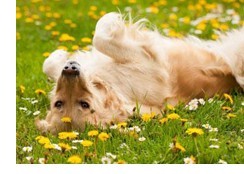
As the days get longer and warmer, you and your pet might be spending more time outside in the garden. Here is a list of some of the more common garden hazards to be aware of!
- Bee and wasp stings: these can cause a painful sting and in some pets, a dangerous anaphylactic reaction. Signs to watch out for include sudden limping, excessive licking, swelling, vomiting or problems breathing. If you think your pet has been stung you should call Pet Doctors on 5576 0400 for advice.
- Snail and slug bait: these are very attractive to pets. Ingestion of small quantities can be rapidly fatal. Be aware of products that claim they are “pet safe” – they are bitter in taste so only act as a deterrent. Pets will still eat these highly toxic baits so you should always consider carefully whether these baits are absolutely necessary in your garden
- Poisonous plants: such as rhododendrons and azaleas, daffodil bulbs and daphne are best avoided. Some lilies (the Lilium or Hemerocallis species including the tiger and Easter lily) if ingested can cause kidney failure in cats. If you are in doubt it’s best to pull them out!
- Fertiliser: unfortunately pets love the smell and taste of some fertilisers and if eaten, these can prove rapidly toxic or even fatal
- Compost: the garden compost heap is very interesting to your pet but the contents contain bacteria, moulds and toxins all of which can make your pet very sick.
- Insecticides and weed killers: these are toxic to pets and should be safely stored and locked up
- Rodent baits: these cause blood clotting disorders and can be deadly. Often signs don’t appear until a few days to weeks after ingestion. Keep these out of reach of pets and again, consider if these baits are absolutely necessary
If you are worried about your pet or think they might be in danger please call Pet Doctors on 5576 0400 for advice.

